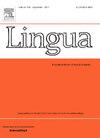Emotion and moral stance in evaluations of impoliteness in L1 and L2 from video clips of workplace interactions
IF 1.3
3区 文学
0 LANGUAGE & LINGUISTICS
引用次数: 0
Abstract
This study investigates how emotions and moral stance influence evaluations of impoliteness between first language (L1) and second language (L2) English users, from an interdisciplinary perspective combining pragmatics, bilingualism, emotion research, and moral psychology. The study widens previous impoliteness research by focusing on both L1 and L2 users and analyses moral stance and emotions following a mixed methods approach. The study was preregistered prior to data collection and analysis. Fifty-five L1 English participants and 45 Spanish-speaking participants with L2 English watched video clips of workplace interactions and assessed the level of impoliteness in these videos. Moreover, the participants indicated the emotions they experienced after watching the video clips and completed the Moral Foundations Questionnaire. The results revealed that L2 users perceived higher levels of impoliteness. By contrast, emotional reactions to impoliteness did not significantly differ between L1 and L2 English users. Qualitative analysis of the participants’ emotions showed that these alluded to notions of moral order, with moral emotions being prevalent. The moral foundation of harm/care appeared to be the most prominent within impoliteness evaluations. In light of the above findings, this study suggests L2 (pragmatics) teaching should raise L2 learners’ awareness of the pesonal and psychological factors involved in impoliteness events, provide input on inferences from gesture, and draw on workplace interactions as a useful context for discussions on infelicitous interactions.
职场互动视频片段对第一、二语言不礼貌行为的情感和道德立场评价
本研究从跨学科的角度,结合语用学、双语学、情感研究和道德心理学,探讨了情感和道德立场如何影响母语和第二语言英语使用者对不礼貌行为的评价。该研究扩大了之前对不礼貌行为的研究,同时关注母语和第二语言使用者,并采用混合方法分析道德立场和情绪。该研究在数据收集和分析之前进行了预登记。55名母语为英语的参与者和45名母语为西班牙语、英语为第二语言的参与者观看了工作场所互动的视频片段,并评估了这些视频中不礼貌的程度。此外,参与者还指出了他们在观看视频片段并完成道德基础问卷后所经历的情绪。结果显示,第二语言使用者感知到的不礼貌程度更高。相比之下,母语和二语使用者对不礼貌的情绪反应没有显著差异。对参与者情绪的定性分析表明,这些情绪暗示了道德秩序的概念,道德情绪普遍存在。伤害/关怀的道德基础似乎在不礼貌评价中最为突出。基于上述发现,本研究建议二语(语用学)教学应提高二语学习者对不礼貌事件中涉及的个人和心理因素的认识,为手势推理提供输入,并将工作场所互动作为讨论不礼貌互动的有用背景。
本文章由计算机程序翻译,如有差异,请以英文原文为准。
求助全文
约1分钟内获得全文
求助全文
来源期刊

Lingua
Multiple-
CiteScore
2.50
自引率
9.10%
发文量
93
审稿时长
24 weeks
期刊介绍:
Lingua publishes papers of any length, if justified, as well as review articles surveying developments in the various fields of linguistics, and occasional discussions. A considerable number of pages in each issue are devoted to critical book reviews. Lingua also publishes Lingua Franca articles consisting of provocative exchanges expressing strong opinions on central topics in linguistics; The Decade In articles which are educational articles offering the nonspecialist linguist an overview of a given area of study; and Taking up the Gauntlet special issues composed of a set number of papers examining one set of data and exploring whose theory offers the most insight with a minimal set of assumptions and a maximum of arguments.
 求助内容:
求助内容: 应助结果提醒方式:
应助结果提醒方式:


